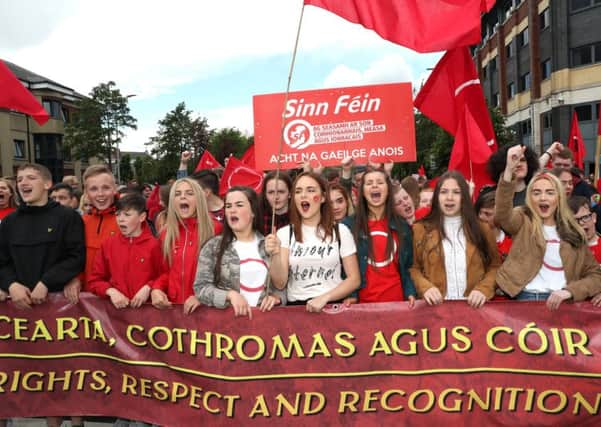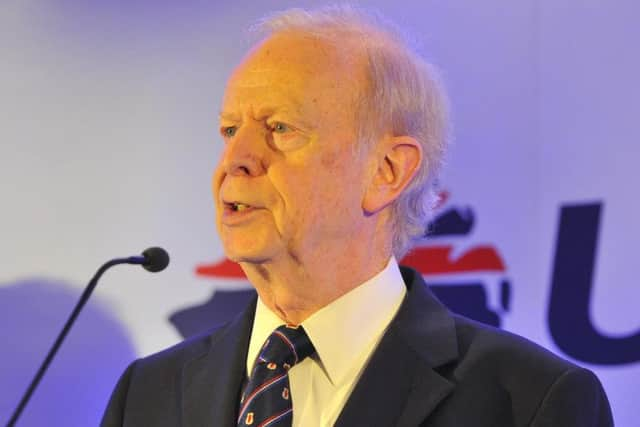Irish language has all the protections it needs: Empey


Concerns have been raised following a rare post-retirement contribution from Peter Robinson – in which the former DUP leader suggested it could be acceptable for “arrangements to be put on a statutory basis to protect and support” both Irish and Ulster Scots.
Although some leading DUP figures have suggested a ‘culture act,’ encompassing both Irish and Ulster Scots, might be appropriate, both Sinn Fein and many Irish language groups have insisted that only a ‘stand-alone’ act would be acceptable.
Advertisement
Hide AdAdvertisement
Hide AdUlster Unionist chairman Sir Reg Empey said sufficient protections for Irish are already in place and no further measures are necessary.


“As far as we are concerned, the issue is covered by the European Charter for Regional and Minority Languages. This was initiated in 1992 but it came into force in March 1998. The UK has to submit to inspections periodically, and we took the view that all our commitments in the Good Friday Agreement had been met.
“There is no doubt, when you think back to December, the crisis could have been avoided at that stage. Now what we have is a commitment, I believe, on the part of the DUP to an act and I think they have been signalling this for some time. They are using Peter [Robinson] now to try to clear the way for them, but it is a u-turn on a major scale.”
Lord Empey said the current drive for a new stand-alone act is being driven by Sinn Fein leader Gerry Adams, and added: “Sinn Fein over the years have driven unionists away from the Irish language, and have done it quite deliberately. It is a heritage – and it should be shared – but they have brought their politics right into the front and centre of it.”
Advertisement
Hide AdAdvertisement
Hide AdFormer Ulster Unionist MP Tom Elliott said“I am not someone who is opposed to Irish language, or people who want to speak it and use it, but I just don’t see the need for an Irish language act.


“Michael McGimpsey of the UUP, after the Belfast Agreement, introduced a whole range of Irish language and Irish cultural issues under the new department of DCAL. He fulfilled what was required and I don’t see what else is necessary. When people are waiting on operations from the health service, and when they have to travel miles for GP cover, or whenever people can’t get broadband to run a business, then I think an Irish language act should be well down the pecking order.”
PUP deputy leader John Kyle also said he regretted that the Irish language has been “politicised”.
He said: “We think that it is part of the cultural heritage of both traditions and we regret the way that Sinn Fein have made a political issue. We think there is a case to be made for greater support for the Irish language but it needs to be done in the context of broader support for both traditions, and that would include the Ulster-Scots tradition as well.”
Advertisement
Hide AdAdvertisement
Hide AdThe East Belfast councillor added: “It needs to be proportionate. We don’t a huge amount of money invested in it and quotas in terms of jobs. But the detail is important.
“I think it is disgraceful the way Sinn Fein have made it a political issue. That has had a chilling effect on unionism – and on many unionist who would be open to exploring more of the history of the Irish language.”
• The main proposals on a possible Irish language act – put out for consultation by the then Department for Culture, Arts and Leisure (DCAL) minister Caral Ni Chuilin in 2015 (as published).
1. Irish to be defined as an official language in the north in such a way as to guarantee services through Irish on a par with those available through English.
Advertisement
Hide AdAdvertisement
Hide Ad2. Provision conferring the right to speak the Irish language in legal proceedings in the north.
3. Provision to require the Irish and English languages to be treated on the basis of equality in the conduct of the proceedings of the Assembly.
4. Provision to create the position of an Irish Language Commissioner – (to, among other responsibilities and powers) ensure that the Irish language is treated no less favourably than the English language. Will include power to initiate prosecutions for a newly created summary offence of refusing or failing to co-operate with the work of the Irish Language Commissioner.
5. All state and semi-state bodies, organisations, institutions, local authorities, private finance initiatives, Assembly and bodies/committees thereof, the courts, the police service to promote Irish by recognising and putting into effect the official language status of Irish and the official Gaeltacht status of any so designated areas. Including: provision for affirmative action in favour of Irish speakers in recruitment to the Civil Service and other public bodies.
Advertisement
Hide AdAdvertisement
Hide Ad6. Provision that all public bodies be required to produce schemes, which set out how Irish language services will be provided.
7. Definition of conditions for recognition of Gaeltacht areas, both rural and urban.
8. Provision for bilingual roadsigns to have the Irish content on a par with English.
9. Provision to guarantee the right to education through the medium of Irish.